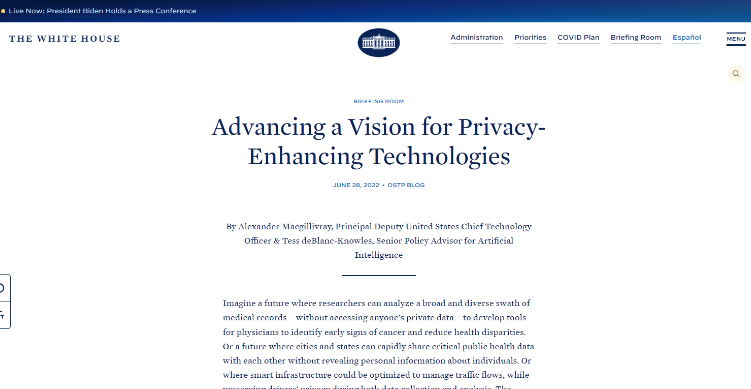(This article appeared as a OSTP BLOG post on June 28, 2022.)
By Alexander Macgillivray, Principal Deputy United States Chief Technology Officer & Tess deBlanc-Knowles, Senior Policy Advisor for Artificial Intelligence
Imagine a future where researchers can analyze a broad and diverse swath of medical records – without accessing anyone’s private data – to develop tools for physicians to identify early signs of cancer and reduce health disparities. Or a future where cities and states can rapidly share critical public health data with each other without revealing personal information about individuals. Or where smart infrastructure could be optimized to manage traffic flows, while preserving drivers’ privacy during both data collection and analysis. The development of Privacy-Enhancing Technologies, commonly known as “PETs,” can provide a pathway toward this future by leveraging data-driven technologies like artificial intelligence (AI), while preserving privacy.
PETs are technologies that will allow researchers, physicians, and others permitted access to gain insights from sensitive data without ever having access to the data itself. The true power of PETs is in keeping data “hidden” from researchers while at the same time enabling analysis of that data. PETs could unlock new forms of collaboration and new norms in the responsible use of personal data. They may enable more collaboration across entities, sectors, and borders to help tackle shared challenges, helping drive solutions in areas such as health care, climate change, financial crime, human trafficking, and pandemic response. However, to date, PETs have not achieved widespread adoption due to a variety of factors — among them, the need for more research and development, limited technical expertise, perceived and possible risks, financial cost, and the lack of generalizable solutions.
As with most technologies, it matters both how PETs are developed and how they will be employed. PETs could usher in a paradigm shift in how we as a society protect privacy while deriving knowledge from data. However, there are also risks that PETs could provide a false veneer of privacy, misleading people into believing that a data sharing arrangement is more private than it really is. Furthermore, in some cases, PETs could exacerbate existing problems with certain types of data analysis, such as discriminatory analysis resulting from biased data.
That’s why the White House office of Science and Technology Policy (OSTP) is seeking public input on how we can responsibly advance and adopt PETs in the United States in a manner that equitably benefits individuals and society. Building on the Biden-Harris Administration’s commitment to leveraging technology to benefit all of America, we have launched an interagency Fast Track Action Committee within the National Science and Technology Council, which OSTP administers, to develop a vision for the role PETs could play in a future data ecosystem and recommend actions, from research and development investments to policy changes, that will be needed to move our Nation toward this future. Members of the public interested in providing their expertise and views to the effort are encouraged to submit responses to our Request for Information by July 8, 2022. These responses will complement the public feedback from nearly 300 members of the public gathered through three public roundtables organized by the Fast Track Action Committee on June 7, 9, and 10.
The mission of OSTP is to maximize the benefits of science and technology to advance health, prosperity, security, environmental quality, and justice for all Americans. We believe PETs can help enable progress in these key areas, from improving healthcare and combatting financial crime, to responding to natural disasters and driving next-generation digital technologies with equity in mind and in a manner that upholds our democratic values.
###


